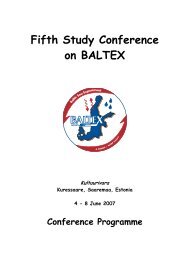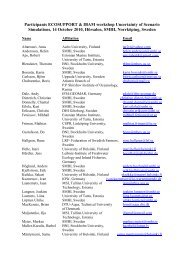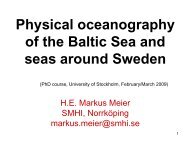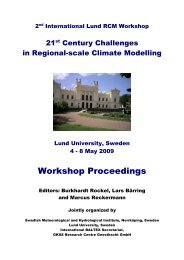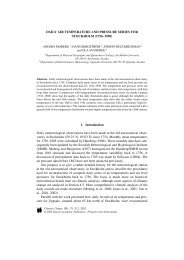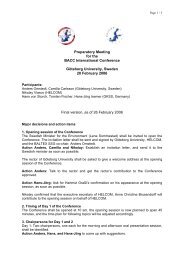Fourth Study Conference on BALTEX Scala Cinema Gudhjem
Fourth Study Conference on BALTEX Scala Cinema Gudhjem
Fourth Study Conference on BALTEX Scala Cinema Gudhjem
You also want an ePaper? Increase the reach of your titles
YUMPU automatically turns print PDFs into web optimized ePapers that Google loves.
On the other hand, if the stratificati<strong>on</strong> over the land surface<br />
is c<strong>on</strong>vective, a sea-breeze circulati<strong>on</strong> is generated, and in<br />
the surface layer it opposes the off-shore wind. In such<br />
c<strong>on</strong>diti<strong>on</strong>s, the wind speed over the sea may remain<br />
practically c<strong>on</strong>stant or slightly decrease with fetch. The<br />
latter holds especially if the stratificati<strong>on</strong> over the sea is<br />
stable. An example is shown in Figure 1. In c<strong>on</strong>diti<strong>on</strong>s of a<br />
very weak geostrophic wind (UG ≤ 4 m/s), the off-shore<br />
comp<strong>on</strong>ent of U10m becomes negative, but an al<strong>on</strong>g-shore<br />
comp<strong>on</strong>ent develops keeping the wind speed almost c<strong>on</strong>stant<br />
with fetch over the first 10 km off the coast. In all<br />
stratificati<strong>on</strong> c<strong>on</strong>diti<strong>on</strong>s over the sea, the wind speed starts to<br />
increase more after a fetch of approximately 30 km (Figure<br />
1), which is bey<strong>on</strong>d the influence of the mesoscale<br />
circulati<strong>on</strong> cell. From the point of view of the wind field<br />
over the sea, the mesoscale c<strong>on</strong>diti<strong>on</strong>s, such as the land-sea<br />
temperature difference, were more important than the<br />
parameterizati<strong>on</strong> method for the sea surface roughness.<br />
C<strong>on</strong>sidering the coastal gradients in air humidity, the initial<br />
model results suggest that in mid-winter c<strong>on</strong>diti<strong>on</strong>s the<br />
relative humidity often decreases with fetch over the sea.<br />
This is qualitatively in agreement with Mietus (1988).<br />
According to the model results, a decrease of specific<br />
humidity with fetch is much more rare, but it may take place<br />
in c<strong>on</strong>diti<strong>on</strong>s realistic for spring and early summer. This is in<br />
agreement with certain cases reported in Niros et al. (2002).<br />
A more detailed comparis<strong>on</strong> of the model results with<br />
coastal, archipelago, and lighthouse stati<strong>on</strong>s is under work.<br />
References<br />
Alestalo, M., and Savijärvi, H., Mesoscale circu-lati<strong>on</strong>s in a<br />
hydrostatic model: coastal c<strong>on</strong>vergence and orographic<br />
lifting, Tellus 37A, 156-162, 1985.<br />
Bumke, K, U. Karger, L. Hasse, and K. Niekamp, Evaporati<strong>on</strong><br />
over the Baltic Sea as an example of a semienclosed<br />
sea, C<strong>on</strong>tr. Atmos. Phys., 71, 249-261, 1998.<br />
Mietus, M., The climate of the Baltic Sea basin, Marine<br />
Meteorology and Related Activities, Report No. 41,<br />
WMO/TD No. 933, World Meteorological Organizati<strong>on</strong>,<br />
Geneve, 62 + 134 p., 1998.<br />
Niros, A., T. Vihma and J. Launiainen, Marine meteorological<br />
c<strong>on</strong>diti<strong>on</strong>s and air-sea exchange processes over<br />
the Baltic Sea in 1990s, Geophysica, 38, 59-87, 2002.<br />
Taylor, P. K., Air-sea interacti<strong>on</strong> / momentum, heat and<br />
vapour fluxes, In: Holt<strong>on</strong>, J. P., Curry, J. A. ja Pyle, J.<br />
(eds.), Encyclopedia of Atmospheric Sciences. Academic<br />
Press, L<strong>on</strong>d<strong>on</strong>, p. 93-102, 2002.<br />
Wu, J., Wind-stress coefficients over sea surface in nearneutral<br />
c<strong>on</strong>diti<strong>on</strong>s, a revisit, J. Phys. Oceanogr., 10, 727-<br />
240, 1980.<br />
- 91 -




